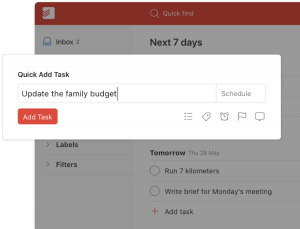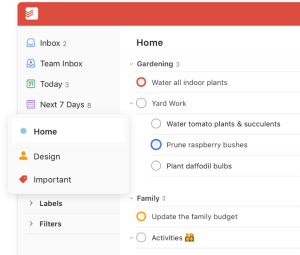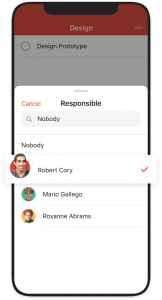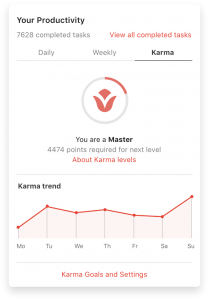Managing time effectively is important when at university, whether it’s studying, completing coursework or exam revision. It is easy to quickly become overwhelmed and feel that there is just not enough time to fit everything in. Making lists of your tasks each day is a great way to keep on top of your work and life.
Todoist is one of the best to-do list apps available. All your information and data is stored and synced in the cloud, which means you can access your lists on any device at any time. If you need some help with organising your life and becoming more productive then Todoist is a good place to start.
Organising your tasks in a list that you can tick off as you complete them can also be beneficial for your mental health. Firstly, knowing you have all of your jobs in a list can give you mental space and stop you worrying or feeling like you have forgotten tasks. Secondly, looking back at your list at the end of the day can really give you a sense of accomplishment. Especially with the current lockdown, it can feel like days are blending into one, but if you can look back at your lists and see that you have actually done quite a lot.
Some of the Key Features of Todoist
Todoist can give you a sense of confidence from knowing that all your tasks are organised and accounted for. It gives you a clear overview of your day and the tasks you need to accomplish. Some of the key features include…
Quick Add
The Quick Add feature allows you to add your tasks in seconds. You can then easily view all your tasks for the day and mark them as complete as you go along.

Recurring Due Dates
This feature helps you commemorate the deadlines and build habits.
Favourites
You can let go of all the clutter and only focus your energy on the important things by easily organising and prioritising your projects and tasks on Todoist. You can plan out your schedules according to what’s most important first and needs immediate attention. The favourite tab helps you do this.

Delegate Tasks
You can also share the workload by delegating tasks to your teammates on Todoist. It’s very efficient and productive for students while working on group projects. The notifications segment in this feature keeps you updated whenever someone completes the task, or post comments. With this feature, you can make all the important information accessible to all the involved members.

Boards
Todoist boards let you easily organise different areas of your life. You could have a board for your studies, a board for your exercise, a board for your social life etc.
Karma
Karma gives you a broad view of your total progress with using the app. Set weekly or daily goals and foresee your work rate trends. Students can use this feature to keep track of how much preparation they’re doing before the exam.

Conclusion
Todoist is an excellent tool that you can use in all areas of your life to help keep yourself productive and motivated. It’s free to get started and to use the basic features however there is a pro option which costs around £30.00 per year, however students can get 70% off at this link.
Download on the mobile app on the App Store and Google Play store.
Or, get the desktop version from Todoist Website.
Learn about other useful apps on our blog.
Thanks for reading, A2B Assessments DSA Needs Assessment Centre
The post Todoist Organisational App appeared first on A2B Assessments DSA Needs Assessment Centre.






